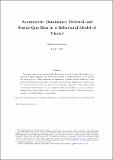Asymmetric dominance, deferral and status quo bias in a behavioral model of choice
Abstract
This paper proposes and axiomatically characterizes a model of choice that builds on the criterion of partial dominance and allows for two types of avoidant behavior: *choice deferral* and *status quo bias*. These phenomena are explained in a unified way that allows for a clear theoretical distinction between them to be made. The model also explains the *strengthening of the attraction effect* that has been observed when deferral is permissible. Unlike other models of status quo biased behavior, the one analyzed in this paper builds on a *unique*, reference-independent preference relation that is acyclic and generally incomplete. When this relation is complete, the model reduces to rational choice.
Citation
Gerasimou , G 2016 , ' Asymmetric dominance, deferral and status quo bias in a behavioral model of choice ' , Theory and Decision , vol. 80 , no. 2 , pp. 295-312 . https://doi.org/10.1007/s11238-015-9499-7
Publication
Theory and Decision
Status
Peer reviewed
ISSN
0040-5833Type
Journal article
Collections
Items in the St Andrews Research Repository are protected by copyright, with all rights reserved, unless otherwise indicated.

